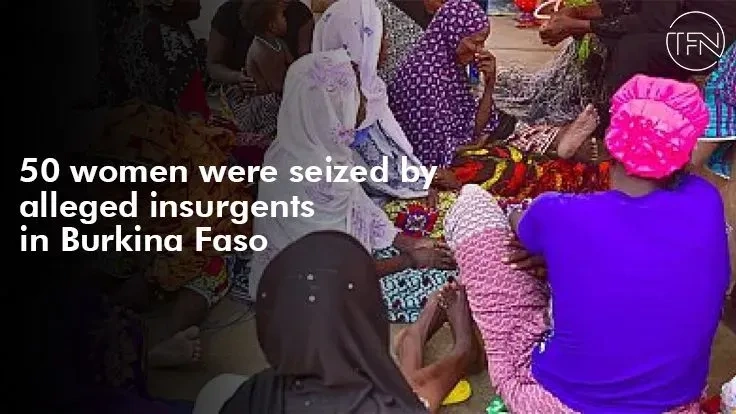
On January 12 and 13, gunmen reportedly kidnapped 50 women in the Soum area of northern Burkina Faso, according to the official report.
The ladies were abducted by armed men while collecting wild fruit west of the town of Aribinda, some 15 kilometers (9.32 miles) from the hamlet of Liki.
Lieutenant-Colonel Rodolphe Sorgho, the governor of the Sahel area, stated in a statement on Monday that attempts to locate all of these innocent victims safely and unharmed "were begun as soon as their absence was revealed."
A security source told the AFP news agency that "all possible methods are being deployed, in the air and on the ground, to locate these ladies."
"Aircraft are circling the region to look for any suspicious activity."
Local authorities claim that attempts to sweep the region by the army and its civilian auxiliary units have been fruitless.
Volker Turk, the head of the UN Human Rights Commission, demanded the release of the women in a statement on Monday.
"I demand the swift, effective, impartial, and independent conduct of an inquiry by the national authorities to identify those guilty and hold them accountable," Turk stated. "I urge for the immediate and unconditional release of all the kidnapped women.
The kidnappings "seriously alarm" the United States, it was said.
Ned Price, a spokesman for the State Department, said in a statement that "those taken must be returned securely to their loved ones promptly and unconditionally, and the fullest extent of the law should be used to hold those responsible accountable."
Burkina Faso, one of the most impoverished nations in the world, has been battling to curb violent activities by armed groups linked to al-Qaeda and ISIL (ISIS), which moved from neighboring Mali in 2015 despite expensive international military attempts to do so.
Two million people have been displaced, forced to live in temporary camps, and thousands of civilians and security personnel have perished.
The most recent abduction, according to a senior commander at military headquarters, is "the first genuinely large kidnapping since the security problem started."
To prevent a disaster or a repeat, everything must be done.
Armed gang fighters have surrounded towns in the nation, obstructing the free flow of people and commerce. According to some organizations, the community of Arbinda has been under an armed group siege for years, rendering women more susceptible to violence if they attempt to flee.
Ousmane Diallo, a researcher at Amnesty International's regional office for West and Central Africa, described the situation in Burkina Faso as "a very worrying and dangerous development that exposes the vulnerability of women in places under siege."
"All sides to the war must uphold the rights of civilians, including their right to an income. In these besieged areas, the government has to pay greater attention to and protect residents, but it also needs to take "a specialized approach to the protection of women and girls," he added.
Idrissa Badini, a representative of civil society, warned about the predicament in Arbinda in November 2022, declaring: "The population, which has spent all its reserves, is on the edge of a humanitarian tragedy."
According to the UN, approximately a million people reside in the north and east of Burkina Faso that are under blockade.
The Economic Community of West African States (ECOWAS) ambassador and former president of Niger, Mahamadou Issoufou, said in June that just 60% of the nation is under the jurisdiction of the capital, Ouagadougou.
Two coups were taken out in 2022 by disgruntled army officers as a protest at the inability to end the war, with each military commander pledging to prioritize security.
According to French officials, as part of its attempts to resolve the crisis, Burkina Faso has hired the Wagner Group, a private Russian mercenary organization. The president of Ghana's neighbor, Nana Akufo-Addo, apparently said the same thing in December.
In the meanwhile, France, a former colonial power and friend of Burkina Faso, released a statement denouncing the kidnapping and demanding the women's quick release.

